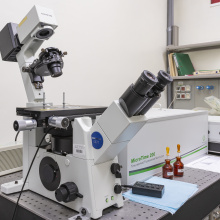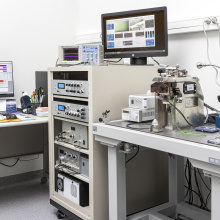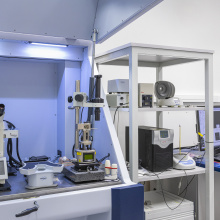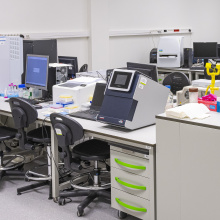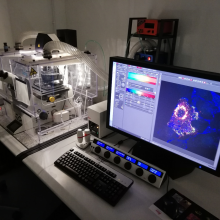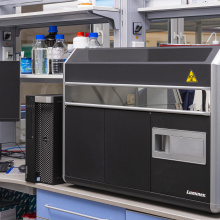imaging
High-Speed Atomic Force Microscope MS-NEX
The MS-NEX system is an Atomic Force Microscope that enables high-resolution imaging of biological samples in a very short time (20 frames / sec - 50 ms / frame - 2000 lines / sec) in aqueous solutions. Ultrafast imaging enables the observation of dynamic processes occurring in the analyzed research systems in real time.
Atomic Force Microscope BioScope Resolve
The BioScope Resolve Atomic Force Microscope with the MultiMode8 Lockout Specs scanning head is a unique AFM system that allows you to observe the dynamics of isolated biochemical systems, whole cells and complex biological systems. This microscope enables high-resolution imaging of very small molecules as well as large eukaryotic cells. It allows you to observe preparations fixed as well as particles in aqueous solutions. https://biotech.ug.edu.pl/atomic_force_microscop_bioscope_resolve
Laboratory of Biomolecular Interactions
The Laboratory of Biomolecular Interactions provides access to a wide range of equipment for studying complex molecular interactions in isolated biochemical systems, whole cells and complex biological systems. The laboratory equipment includes BioScope Resolve Atomic Force Microscope, High-Speed Atomic Force Microscope MS-NEX, Biacore T200 biosensor system, Monolith NT.115 and Circular Dichroism Spectrometer Jasco J-1500.
Laboratory of imaging and data analysis
The laboratory offers a wide range of imaging possibilities of various objects. The laboratory specializes in imaging alive or fixed biological preparations in visible and fluorescent light. Additionally, a variety of analyzes of the obtained images can be performed in the laboratory.
Amnis ImageStreamX Mk II Imaging Flow Cytometer System
Imaging flow cytometry, 3 lasers (405nm, 488nm, 642nm), 3 objectives (20x, 40x, 60x), 12 imaging channels, IDEAS software. https://www.luminexcorp.com/imagestreamx-mk-ii/ https://biotech.ug.edu.pl/amnis_imagestreamx_mk_ii_imaging_flow_cytomet… Cell counting and imaging: studying the cell subpopulation, studying the level and localization of the investigated factors inside the cell.

